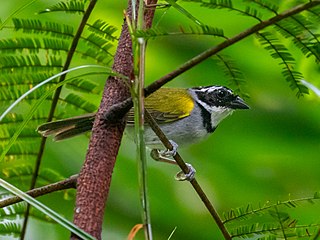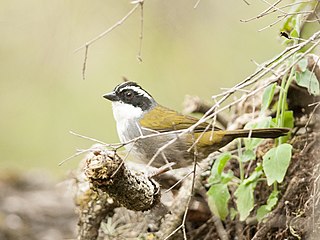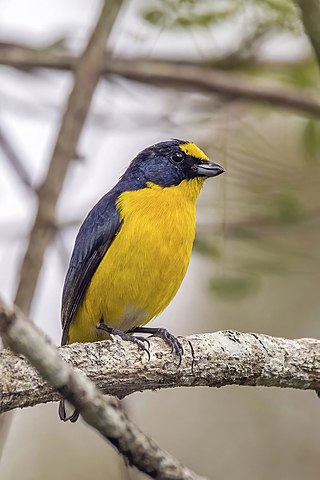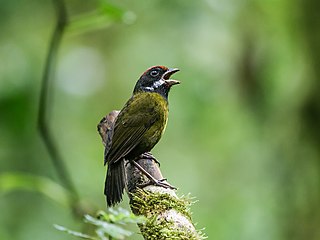
The rufous-breasted wren is a small songbird of the family Troglodytidae. It is found in Colombia, Costa Rica, Panama, Trinidad and Tobago, and Venezuela.

The golden-olive woodpecker is a species of bird in the subfamily Picinae of the woodpecker family Picidae. It is found from Mexico south and east through Panama, in every mainland South American country except Chile, Paraguay, and Uruguay, and Trinidad and Tobago.

The collared aracari or collared araçari is a near-passerine bird in the toucan family Ramphastidae. It is found from Mexico to Colombia and Venezuela.

The purple-throated mountaingem is a species of hummingbird in tribe Lampornithini of subfamily Trochilinae. It is found in Costa Rica, Nicaragua, and Panama.

The common chlorospingus, also referred to as common bush tanager, is a small passerine bird. It is a resident breeder in the highlands from central Mexico south to Bolivia and northwest Argentina. C. flavopectus in the loose sense is a notorious cryptic species complex, and several of the up to 25 subspecies recognized in recent times are likely to be distinct species. Some populations in fact appear to be more distinct than several other members of Chlorospingus.

The white-eared ground sparrow is a large American sparrow which occurs locally in Middle America, mostly in foothills, from southern Mexico and Guatemala to northern Costa Rica.

The yellow-faced grassquit is a passerine bird in the tanager family Thraupidae and is the only member of the genus Tiaris. It is native to Central America, South America, and the Caribbean.

The Cape siskin is a small passerine bird in the finch family. It is an endemic resident breeder in the southern Cape Province of South Africa.

The Drakensberg siskin is a small passerine bird in the finch family. It is an endemic resident breeder in the eastern Cape Province Transkei and western Natal in South Africa, and in Lesotho.

Arremon is a genus of neotropical birds in the family Passerellidae. With the exception of the green-striped brushfinch which is endemic to Mexico, all species are found in South America, with a few reaching Central America.

The Cuzco brushfinch, also known as the grey brushfinch or sooty brushfinch, is a species of bird in the family Passerellidae. It is endemic to humid Andean forest in southeastern Peru, where mainly found in Cusco. It is sometimes considered a subspecies of the slaty brushfinch.

The white-browed brushfinch is a species of bird in the family Passerellidae. It lives in northwestern Argentina, Bolivia, and southern Peru. It is generally common in forest and dense second growth, mainly at altitudes of 2,000 to 3,000 metres, but locally it occurs at far lower altitudes. It previously was considered the nominate subspecies of the stripe-headed brushfinch.

Chlorospingus is a genus of perching birds, the bush tanagers, traditionally placed in the tanager family (Thraupidae). More recent studies which suggest they are closely related to the genus Arremonops in the Passerellidae. As of July, 2017, the American Ornithological Society assigns the genus to the new family Passerellidae, which contains the New World sparrows.

The yellow-throated euphonia is a species of songbird in the family Fringillidae. It is found in southeastern Mexico and throughout Central America with its range stretching from Belize south to western Panama. It inhabits primarily both humid and dry regions where it prefers the forest edge, open woodland, and shaded plantations. It has two subspecies, the nominate subspecies Euphonia hirundinaceahirundinacea and Euphonia hirundinacea gnatho. This finch is a small bird with pointed wings and a short bill and short tail. Males of this species have dark glossy blue-black upperparts excluding a yellow forecrown, and bright yellow underparts, while females have olive green upperparts and whitish-gray breast and lower parts. It has a shrill song that alternates between high-pitched and moderately pitched and appears to be able to mimic some calls of other birds.

The olive finch is a species of bird in the family Passerellidae. Until recently, it was placed in the genus Lysurus.

The sooty-faced finch is a species of bird in the family Emberizidae. Until recently, it was placed in the genus Lysurus.

Cabanis's spinetail is a species of bird in the Furnariinae subfamily of the ovenbird family Furnariidae. It is found in Brazil, Bolivia, and Peru.

The moustached brushfinch is a species of bird in the family Passerellidae.

The black-headed brushfinch is a species of bird in the family Passerellidae. It lives in the undergrowth of humid forest, especially near edges, at altitudes of 300 to 1,200 metres in Colombia and Panama.





















